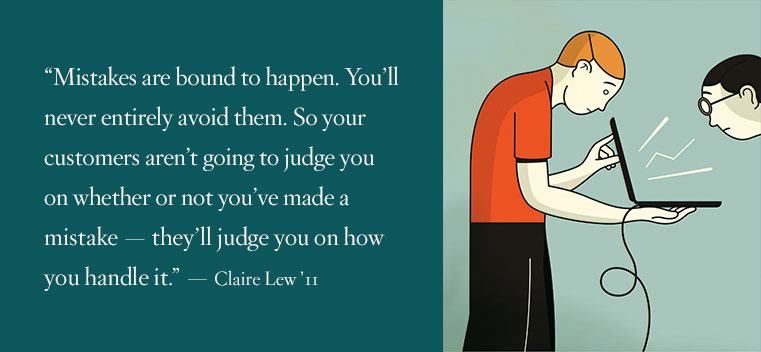
To Err Is Human; to Own Up, Sublime
Claire Lew ’11 of Chicago is CEO of Know Your Company, a software firm that helps business owners overcome growing pains. She was Associated Student Government president in 2010–11.
This article was originally published in Signal v. Noise, a Basecamp web publication.
Tell us what you think. E-mail comments or questions to the editors at letters@northwestern.edu.
Find Us on Social Media
Coming clean helps a young CEO define her company.
We made a huge mistake.
A while back we built a new feature in Know Your Company, our firm’s software that helps CEOs understand their company’s culture. During that process we accidentally wrote a bit of code that caused private responses to be revealed to new employees in a company.
This means that for the past six months, when new employees were added to Know Your Company, they were able to view responses that only their CEO was supposed to see.
Ugh.
It was a horrible mistake … and we were just finding out about it. It affected about 80 companies and hundreds of employees. I still feel sick to my stomach when I think about it.
One of our customers noticed the error and was kind enough to tell us. Our other customers hadn’t noticed the problem (or at least hadn’t told us if they had).
Now I was faced with a big decision: Should I tell our other customers about it?
One could argue that, if customers hadn’t noticed, why say anything? Why ruffle feathers, especially when the damage had already been done?
Saying something could cause our business harm. Customers might be angry. Some of them might even leave.
Or we could come clean. I could be upfront about what happened, own up to our mistake and say how terribly sorry we were. Sure, we would risk losing business. But what about the risk of losing the trust of our customers?
Trust, after all, is everything.
I also thought, “If I were a customer, wouldn’t I want to know?” As a CEO myself, I would want to know that those private responses had been accessible to my new employees, even if I couldn’t do anything about it.
To gut-check myself, I called Jason Fried, the CEO of Basecamp, to get his two cents’ worth. (Basecamp originally built the Know Your Company software and is a co-owner and adviser to our business.)
Here’s what Jason said: “I like moments like this. It’s an opportunity to show what kind of company you are. You get to show your customers what you stand for.”
Those words were all I needed to hear.
I decided to personally email the 80-some CEOs affected by our mistake. In a short note I explained what we messed up and how sorry we were.
I offered a small credit as a token of how bad we felt, knowing of course that it wouldn’t make up for the mistake. I gave folks my personal cellphone number and told them to call me anytime.
Then I braced myself for the reaction.
I got a flood of replies from customers. Not a single one was negative. A few folks were concerned (as they ought to be!), but no one was angry. No one left.
In fact, the response from customers was overwhelmingly positive. People said, “Thank you for letting me know,” and, “No biggie. These things happen.”
One of our customers in the Netherlands emailed me, saying, “We have a saying in Dutch: waar gewerkt wordt, worden fouten gemaakt. That translates to ‘Where people work, mistakes are made.’ ”
Another person replied to me, “We all screw up from time to time. Go have a cocktail.”
I even had one customer who said he was so impressed with the email I’d sent, he forwarded it to his entire company as an example of how to handle an error.
Our mistake became a positive moment for our company. It solidified who we are and what we stand for, and it showed our customers that too.
Mistakes are bound to happen. You’ll never entirely avoid them. So your customers aren’t going to judge you on whether or not you’ve made a mistake — they’ll judge you on how you handle it.
It’s a hard thing to remember when you’re in the middle of a fire. But in that moment, simply ask yourself: “What kind of company are we?”
You’ll know what to do.



 Facebook
Facebook Twitter
Twitter Email
Email


